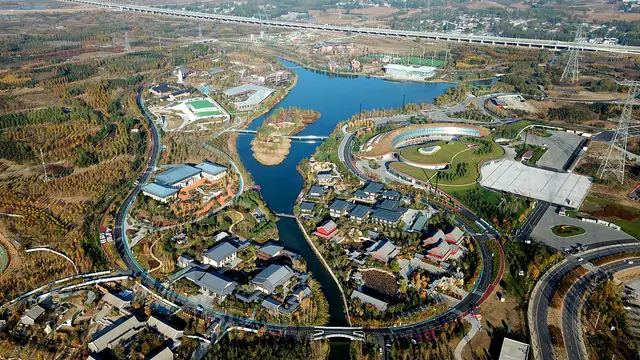Across Xiong'an New Area in north China's Hebei Province, another new area of "national significance" following the Shenzhen Special Economic Zone and Shanghai Pudong New Area, a number of key projects are underway, as the area is about to usher in its seventh year of development.
The receiver of Beijing's non-capital functions
China announced the plan to establish Xiong'an New Area on April 1st, 2017. Located 100 kilometers southwest of Beijing, the area is shouldered with the major task of relieving Beijing of functions nonessential to its role as the nation's capital, and to boost the coordinated development of the Beijing-Tianjin-Hebei region.
By the end of 2022, Xiong'an New Area has already seen an inflow of a total of over 510 billion yuan ($74.2 billion) in investment earmarked for 240 major projects. Another 270 key projects are expected to be launched this year, with the overall investment totaling 664 billion yuan ($96.7 billion), according to official information.
Over the past six years, state-owned enterprises have set up more than 140 institutions here. The first batch of 40 enterprises have settled in Xiong'an Business Service Center. A key site housing relocated enterprises and institutions from Beijing, the industry cluster featuring financial business, modern services and digital economy is taking shape. As of March 2022, close to 4,000 firms had registered in Xiong'an, with more than 80 percent of them being scientific and technological enterprises relocated from the capital.
The area has also become the new home for several formerly Beijing-based universities, hospitals and public institutions.
A showcase of innovation-driven development
Dubbed China's "city of the future," Xiong'an is being developed towards a demonstration zone of innovation-driven development in China.
The integration and application of the Internet of Things (IoT) technologies, artificial intelligence, big data and cloud computing were underlined as key elements in the planning and designing of the city.
In 2020, a blockchain lab was established in the area, with the mission of doing research on and applying blockchain technologies and concepts to the construction of a new smart city.
Over 3,000 companies have registered on a local industrial internet service platform which is based on the application of blockchain technologies, since the platform's inception in February last year.
As the "city brain" of the area, the Xiong'an Urban Computing Center was put into operation last year. It is designed to be the city's computing system that integrates edge computing, cloud computing and supercomputing, offering computing and storage services for big data, blockchain, AI, VR, and AR sectors.
A new highland for opening-up
Apart from the role of facilitating non-capital functions transferred from Beijing, the government also expects the area to be a new highland for opening-up and international cooperation.
In January, a list of 20 measures was introduced by the Foreign Affairs Office of Hebei Province, intended to support Xiong'an in enhancing international communication and collaboration. The measures span from facilitating business exchanges to attracting foreign capital, technology and talents.
The area serves as a national model of high-quality development and a new engine for the modern economic system. According to the 2018-2035 master plan for Xiong'an, by 2035, the area will basically develop itself into a modern city that is green, intelligent and livable, with relatively strong competitiveness and harmonious human-environment interaction.
(CGTN)
 简体中文
简体中文

